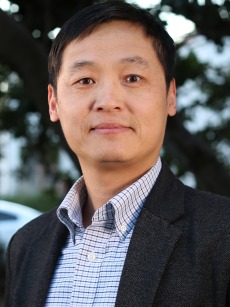
Teaches Buddhism, Chinese thought, and religion.
Dr. Jiang Wu is currently Regents Professor in the Department of East Asian Studies, director of Center for Buddhist Studies. He received his Master's degree from Nankai University (1994) and Ph.D. from Harvard University (2002). His research interests include seventeenth-century Chinese Buddhism, especially Chan/Zen Buddhism, the role of Buddhist canons in the formation of East Asian Buddhist culture, and the historical exchanges between Chinese Buddhism and Japanese Buddhism. Other interests include Confucianism, Chinese intellectual history and social history, and the application of electronic cultural atlas tools in the study of Chinese culture and religion. He has published articles in Asia Major, Journal of East Asian History, Journal of Chinese Philosophy, and Monumenta Serica on a variety of topics. His first book Enlightenment in Dispute: The Reinvention of Chan Buddhism in Seventeenth-century China was published by Oxford University Press in 2008. His Leaving for the Rising Sun: Chinese Zen Master Yinyuan and the Authenticity Crisis in Early Modern East Asia (Oxford, 2016; 384 pages) won the inaugural Tianzhu Best Book in Chan Studies Award. He was awarded the Certificate of Congressional Recognition by U.S. Congressional Representative Judy Chu (27th District of California) and the City of Rosemead, California’s Award of Recognition (November 10, 2018). He received the Guggenheim Fellowship in 2023. He was one of the Academic Consultants for the BBC’s series Earth’s Sacred Wonders, first aired on August 7, 2019. Recent publications include
- Leaving for the Rising Sun: Chinese Zen Master Yinyuan and the Authenticity Crisis in Early Modern East Asia (Oxford 2015)
- Spreading Buddha’s Word in East Asia: The Formation and Transformation of the Chinese Buddhist Canon(Columbia 2016)
- Reinventing the Tripitaka: Transformation of the Buddhist Canon in Modern East Asia (Lexington 2017)
- The Formation of Regional Religious Systems in Greater China (Routledge 2022)
- The Digital World in an Age of Uncertainty: Humanizing Technology for Wellness, Resilience, and Creativity (IEEE 2022)
Recent Grants:
Recipient of the 2023 Guggenheim Fellowship for the book project “Scripture and Modernity: The Ōbaku Buddhist Canon in East Asia and the West.”
Recipient of the 2021 Chiang-ching Kuo Foundation Scholar's grant for the book project “Scripture and Modernity: The Ōbaku Buddhist Canon in East Asia and the West.”
Participant of the 2019 NEH Grant “Developing Foreign Cultures Courses for the Professions.”
Recipient of the 2019 Center for Digital Humanities Pilot Project Development Award for the project “Revamping the BGIS Database and Website with a Focus on Hangzhou Buddhism."
Recipient of the 2016 Chiang Ching-Kuo Foundation grant for the conference “The Formation of Regional Religious Systems in Greater China."
Recipient of 2014 Provost Author Support Fund for the Publication of “Leaving for the Rising Sun: Chinese Zen Master Yinyuan Longqi and the Authenticity Crisis in Early Modern East Asia.” (Forthcoming, Oxford University Press, 2014)
Principle investigator, scholar grant from Chiang-ching Kuo Foundation for Cultural Exchanges for a book project entitled: “Leaving for the Rising Sun: Chinese Zen Master Yinyuan Longqi and the Authenticity Crisis in Early Modern East Asia.” (Forthcoming, Oxford University Press, 2014)
Co-principal investigator, grant from International Center for Buddhist Studies at Renmin University for building a Research Lab for Spatial Analysis of Religion (SAR) at the University of Arizona.
Japan Foundation short-term fellowship for research in Kyoto during the summer of 2013, project title: “The Image of Edo Japan in Chinese Monks’ Travel Writings.”
Chief participant, National Science Foundation of China (NSFC) grant for “Buddhism and the Production of Social Space in Jiangnan during 1386–1949” for a period of four years (2013-2017)
Principal investigator, Confluence Center at the University of Arizona research grant for a project entitled “Analyzing Regional Religious Systems in China.” 2013-2014
Co-principal investigator, CCKF conference grant for the conference “The Chinese Buddhist Canon in the Age of Printing: An East Asian perspective,” held in March at the University of the West, Los Angeles, March 18–20, 2013.

